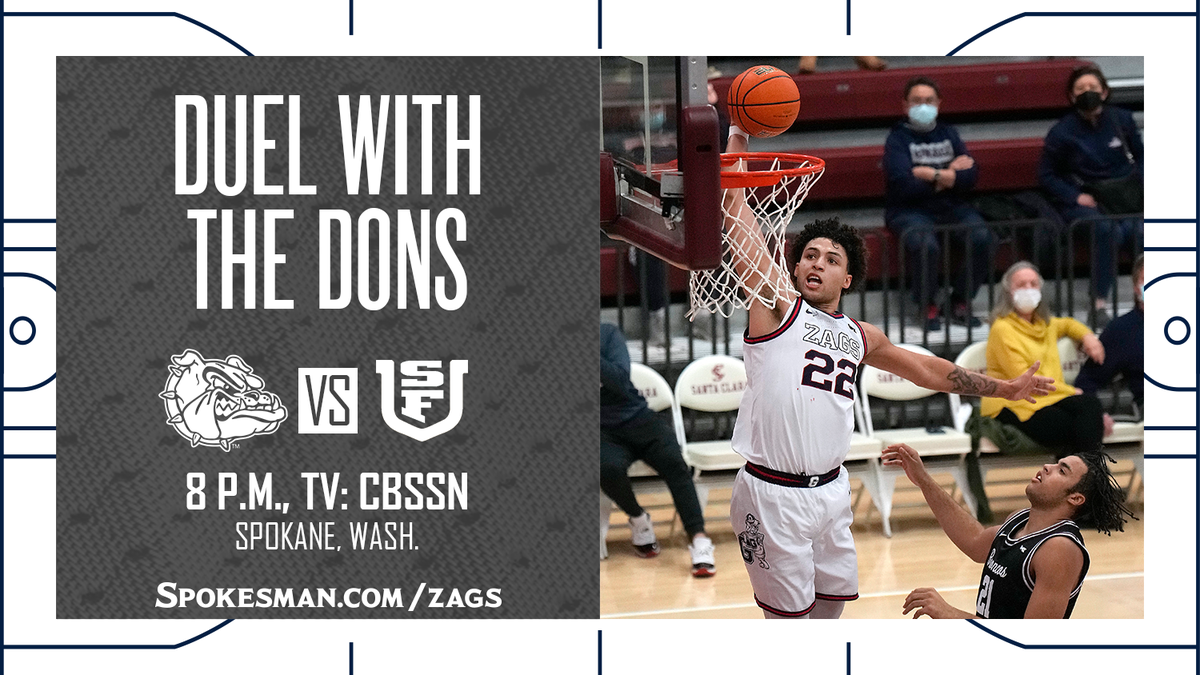San Francisco’s success shouldn’t catch top-ranked Gonzaga by surprise

San Francisco’s 10-0 start, ascension to No. 34 in the NET rankings and projection as an NCAA Tournament team has surprised many in the college basketball world.
That lengthy list doesn’t include Dons coach Todd Golden.
While West Coast Conference coaches pegged San Francisco fifth in the preseason poll with a point total closer to No. 6 Santa Clara than No. 4 Loyola Marymount, Golden had an inkling last summer that his veteran squad could make noise in the conference and beyond.
“Honestly, when we got all these guys on campus June 15th, I felt pretty good about this group,” Golden said.
By then, Golden and his staff had brought in four key transfers – Yauhen Massalski (San Diego), Patrick Tapé (Duke), Zane Meeks (Nevada) and Gabe Stefanini (Columbia) – to complement the dynamic guard tandem of Jamaree Bouyea and Khalil Shabazz.
While the 6-foot-3 Stefanini joined Bouyea and Shabazz in the starting backcourt, the three bigs, led by Massalski, reinforced the frontcourt, which was a concern spot last season.
USF (15-3, 3-1 WCC) has four Quad 1/2 wins and just came up short in three others, falling to BYU, Loyola Chicago and Grand Canyon by a combined eight points.
If not for a bumpy final few minutes in Saturday’s 71-69 loss to BYU, Thursday’s Gonzaga-San Francisco game at the McCarthey Athletic Center would be for solo first place in the conference.
Nevertheless, the Dons pose unique challenges to Gonzaga (14-2, 3-0) with their experience, play-making guards and interior presence. It starts with super senior Bouyea, who averages 17.9 points, 4.9 rebounds and 3.8 assists. Seattle native Shabazz, who began his career at Central Washington in 2017-18, adds 12.6 points and a WCC-leading 2.0 steals.
The 6-9, 240-pound Massalski, another super senior who didn’t average double figures in any of four seasons at San Diego, ranks second on the team at 14.1 points and leads USF in rebounds (8.2) and blocks (2.3). Gonzaga’s Chet Holmgren paces the conference at 8.5 boards and 3.4 blocks.
“Last year we were missing a rim finisher and inside scorer,” Golden said. “Yauhen saw an opportunity to come here with some really good guards that can spread the floor and give him space to operate.”
The transfers, including former Washington State forward Volodymyr Markovetskyy, have helped improve USF’s performance at both ends of the court.
“From an analytics standpoint, if we could bring in some good, mature players we thought we could get really good really quickly,” Golden said. “We’ve defended the 2-pointer and scored on 2s. We made 51.5% on 2-pointers last year, we’re at 57.4%. I think that’s ninth (nationally). Of course, the Zags are first at 63.7%.
“We’re top 100 in 2-point defense. Last year, we were top 200.”
The Zags, who have scored at least 110 points in three conference blowouts, and Dons were set to play Jan. 6, but that was postponed in response to COVID-19 concerns in GU’s program. It was rescheduled for Thursday with Portland agreeing to shift its home game vs. USF from Thursday to Feb. 5.
“I told Mark (Few, Gonzaga coach) I want to play the game, but we’re not going to put you on a Tuesday when I have to go play Saint Mary’s and Santa Clara on Thursday and Saturday,” Golden said. “Fortunately, Portland was a great partner and willing to move that game.”
Golden said the team’s first focus is limiting GU’s transition game.
“Nobody has been able to do it, but you have to try to do it,” he said. “We have at times have been able to do it the past couple years and just try to make them do things they don’t want to do.
“I know coach Few and the program well enough, there’s certain things they’re striving to do, and if you can keep them off-balance or throw different looks at them … you have to be willing to get out of your comfort zone, like we have in the past. It’s house money. You’re expected to go up there and lose, so why not go for it and see what happens?”
The Dons haven’t made the NCAA Tournament since 1998. They’re projected as a No. 10 seed by ESPN’s Joe Lunardi, but they have work to do to stay in the 68-team field.
“Our margin for error shrunk a little bit, but some of our wins will travel for us all year,” Golden said. “We have to take care of business and can’t afford to lose any we shouldn’t. As long as we pick off a couple more at the top of the league, we’ll be in good shape.”